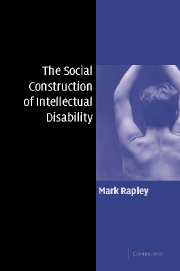Book contents
- Frontmatter
- Contents
- Acknowledgements
- A note on the cover illustration
- A note on transcription notation
- Introduction
- 1 A discursive psychological approach
- 2 Intellectual disability as diagnostic and social category
- 3 The interactional production of ‘dispositional’ characteristics: or why saying ‘yes’ to one's interrogators may be smart strategy
- 4 Matters of identity
- 5 Talk to dogs, infants and …
- 6 A deviant case (written with Alec McHoul)
- 7 Some tentative conclusions
- Appendices
- References
- Index
4 - Matters of identity
Published online by Cambridge University Press: 20 October 2009
- Frontmatter
- Contents
- Acknowledgements
- A note on the cover illustration
- A note on transcription notation
- Introduction
- 1 A discursive psychological approach
- 2 Intellectual disability as diagnostic and social category
- 3 The interactional production of ‘dispositional’ characteristics: or why saying ‘yes’ to one's interrogators may be smart strategy
- 4 Matters of identity
- 5 Talk to dogs, infants and …
- 6 A deviant case (written with Alec McHoul)
- 7 Some tentative conclusions
- Appendices
- References
- Index
Summary
‘Retard’ … is a common expression of derision among today's youth. It is no surprise, then, that those who bear this diagnostic label, and understand its stigmatizing quality, wish to avoid it.
(Baroff, 1999 cited in Schroeder et al. 2002: 90)The truthful rendering into speech of who one is … is installed at the heart of contemporary procedures of individualization. In the act of speaking, through the obligation to produce words that are true to an inner reality … one becomes a subject for oneself.
(Rose, 1999b: 244)This chapter turns to look at the manner in which people with intellectual disabilities themselves describe and account for their identities as such persons, drawing on both ethnographic and interview data. Of course, such an approach takes the very real risk of failing what Jonathan Potter has called the ‘dead psychologist’ test, or, as David Silverman (2001) would have it, of lapsing into soppy – or at least questionably rigorous – romanticism. Attentive to the dangers of romanticising sound bites, and perhaps of being accused of treating talk as a window onto the soul, we will start with a preview of the issues at hand.
- Type
- Chapter
- Information
- The Social Construction of Intellectual Disability , pp. 111 - 141Publisher: Cambridge University PressPrint publication year: 2004



